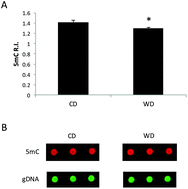当前位置:
X-MOL 学术
›
Food Funct.
›
论文详情
Our official English website, www.x-mol.net, welcomes your
feedback! (Note: you will need to create a separate account there.)
Chronic consumption of a western diet modifies the DNA methylation profile in the frontal cortex of mice†
Food & Function ( IF 5.1 ) Pub Date : 2018-01-19 00:00:00 , DOI: 10.1039/c7fo01602f Amy S. Yokoyama 1, 2, 3, 4, 5 , Keith Dunaway 3, 4, 5, 6, 7 , Jennifer Rutkowsky 4, 5, 7, 8, 9 , John C. Rutledge 1, 2, 3, 4, 5 , Dragan Milenkovic 1, 2, 3, 4, 5
Food & Function ( IF 5.1 ) Pub Date : 2018-01-19 00:00:00 , DOI: 10.1039/c7fo01602f Amy S. Yokoyama 1, 2, 3, 4, 5 , Keith Dunaway 3, 4, 5, 6, 7 , Jennifer Rutkowsky 4, 5, 7, 8, 9 , John C. Rutledge 1, 2, 3, 4, 5 , Dragan Milenkovic 1, 2, 3, 4, 5
Affiliation

|
In our previous work in mice, we have shown that chronic consumption of a Western diet (WD; 42% kcal fat, 0.2% total cholesterol and 34% sucrose) is correlated with impaired cognitive function. Cognitive decline has also been associated with alterations in DNA methylation. Additionally, although there have been many studies analyzing the effect of maternal consumption of a WD on DNA methylation in the offspring, few studies have analyzed how an individual's consumption of a WD can impact his/her DNA methylation. Since the frontal cortex is involved in the regulation of cognitive function and is often affected in cases of cognitive decline, this study aimed to examine how chronic consumption of a WD affects DNA methylation in the frontal cortex of mice. Eight-week-old male mice were fed either a control diet (CD) or a WD for 12 weeks, after which time alterations in DNA methylation were analyzed. Assessment of global DNA methylation in the frontal cortex using dot blot analysis revealed that there was a decrease in global DNA methylation in the WD-fed mice compared with the CD-fed mice. Bioinformatic analysis identified several networks and pathways containing genes displaying differential methylation, particularly those involved in metabolism, cell adhesion and cytoskeleton integrity, inflammation and neurological function. In conclusion, the results from this study suggest that consumption of a WD alters DNA methylation in the frontal cortex of mice and could provide one of the mechanisms by which consumption of a WD impairs cognitive function.
中文翻译:

长期食用西方饮食会改变小鼠额叶皮层的DNA甲基化谱图†
在我们以前的小鼠研究中,我们发现长期食用西方饮食(WD; 42%千卡脂肪,0.2%总胆固醇和34%蔗糖)与认知功能受损有关。认知能力下降也与DNA甲基化的改变有关。此外,尽管有许多研究分析了母体消耗WD对后代DNA甲基化的影响,但很少有研究分析了个体食用WD如何影响他/她的DNA甲基化。由于额叶皮层参与认知功能的调节,并且常在认知功能减退的情况下受到影响,因此本研究旨在研究长期服用WD会如何影响小鼠额叶皮层的DNA甲基化。对八周大的雄性小鼠喂食对照饮食(CD)或WD,持续12周,之后,分析DNA甲基化的变化。使用斑点印迹分析评估额叶皮层中的整体DNA甲基化表明,与CD喂养的小鼠相比,WD喂养的小鼠的整体DNA甲基化有所降低。生物信息学分析确定了几个网络和途径,这些网络和途径包含显示差异甲基化的基因,特别是那些参与代谢,细胞粘附和细胞骨架完整性,炎症和神经功能的基因。总之,这项研究的结果表明,消耗WD会改变小鼠额叶皮层的DNA甲基化,并可能提供一种消耗WD损害认知功能的机制之一。使用斑点印迹分析评估额叶皮层中的整体DNA甲基化表明,与CD喂养的小鼠相比,WD喂养的小鼠的整体DNA甲基化有所降低。生物信息学分析确定了几个网络和途径,这些网络和途径包含显示差异甲基化的基因,特别是那些参与代谢,细胞粘附和细胞骨架完整性,炎症和神经功能的基因。总之,这项研究的结果表明,消耗WD会改变小鼠额叶皮层的DNA甲基化,并可能提供一种消耗WD损害认知功能的机制之一。使用斑点印迹分析评估额叶皮层中的整体DNA甲基化表明,与CD喂养的小鼠相比,WD喂养的小鼠的整体DNA甲基化有所降低。生物信息学分析确定了几个网络和途径,这些网络和途径包含显示差异甲基化的基因,特别是那些参与代谢,细胞粘附和细胞骨架完整性,炎症和神经功能的基因。总之,这项研究的结果表明,消耗WD会改变小鼠额叶皮层的DNA甲基化,并可能提供一种消耗WD损害认知功能的机制之一。生物信息学分析确定了几个网络和途径,这些网络和途径包含显示差异甲基化的基因,特别是那些参与代谢,细胞粘附和细胞骨架完整性,炎症和神经功能的基因。总之,这项研究的结果表明,消耗WD会改变小鼠额叶皮层的DNA甲基化,并可能提供一种消耗WD损害认知功能的机制之一。生物信息学分析确定了几个网络和途径,这些网络和途径包含显示差异甲基化的基因,特别是那些参与代谢,细胞粘附和细胞骨架完整性,炎症和神经功能的基因。总之,这项研究的结果表明,消耗WD会改变小鼠额叶皮层的DNA甲基化,并可能提供一种消耗WD损害认知功能的机制之一。
更新日期:2018-01-19
中文翻译:

长期食用西方饮食会改变小鼠额叶皮层的DNA甲基化谱图†
在我们以前的小鼠研究中,我们发现长期食用西方饮食(WD; 42%千卡脂肪,0.2%总胆固醇和34%蔗糖)与认知功能受损有关。认知能力下降也与DNA甲基化的改变有关。此外,尽管有许多研究分析了母体消耗WD对后代DNA甲基化的影响,但很少有研究分析了个体食用WD如何影响他/她的DNA甲基化。由于额叶皮层参与认知功能的调节,并且常在认知功能减退的情况下受到影响,因此本研究旨在研究长期服用WD会如何影响小鼠额叶皮层的DNA甲基化。对八周大的雄性小鼠喂食对照饮食(CD)或WD,持续12周,之后,分析DNA甲基化的变化。使用斑点印迹分析评估额叶皮层中的整体DNA甲基化表明,与CD喂养的小鼠相比,WD喂养的小鼠的整体DNA甲基化有所降低。生物信息学分析确定了几个网络和途径,这些网络和途径包含显示差异甲基化的基因,特别是那些参与代谢,细胞粘附和细胞骨架完整性,炎症和神经功能的基因。总之,这项研究的结果表明,消耗WD会改变小鼠额叶皮层的DNA甲基化,并可能提供一种消耗WD损害认知功能的机制之一。使用斑点印迹分析评估额叶皮层中的整体DNA甲基化表明,与CD喂养的小鼠相比,WD喂养的小鼠的整体DNA甲基化有所降低。生物信息学分析确定了几个网络和途径,这些网络和途径包含显示差异甲基化的基因,特别是那些参与代谢,细胞粘附和细胞骨架完整性,炎症和神经功能的基因。总之,这项研究的结果表明,消耗WD会改变小鼠额叶皮层的DNA甲基化,并可能提供一种消耗WD损害认知功能的机制之一。使用斑点印迹分析评估额叶皮层中的整体DNA甲基化表明,与CD喂养的小鼠相比,WD喂养的小鼠的整体DNA甲基化有所降低。生物信息学分析确定了几个网络和途径,这些网络和途径包含显示差异甲基化的基因,特别是那些参与代谢,细胞粘附和细胞骨架完整性,炎症和神经功能的基因。总之,这项研究的结果表明,消耗WD会改变小鼠额叶皮层的DNA甲基化,并可能提供一种消耗WD损害认知功能的机制之一。生物信息学分析确定了几个网络和途径,这些网络和途径包含显示差异甲基化的基因,特别是那些参与代谢,细胞粘附和细胞骨架完整性,炎症和神经功能的基因。总之,这项研究的结果表明,消耗WD会改变小鼠额叶皮层的DNA甲基化,并可能提供一种消耗WD损害认知功能的机制之一。生物信息学分析确定了几个网络和途径,这些网络和途径包含显示差异甲基化的基因,特别是那些参与代谢,细胞粘附和细胞骨架完整性,炎症和神经功能的基因。总之,这项研究的结果表明,消耗WD会改变小鼠额叶皮层的DNA甲基化,并可能提供一种消耗WD损害认知功能的机制之一。











































 京公网安备 11010802027423号
京公网安备 11010802027423号